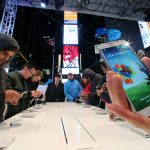Google shutting down Reader is great news
I’m a big fan of Google Reader. I don’t just access it every day, I access it, probably on average, every couple of hours or so (and still do, despite my switch to Microsoft). I have hundreds of feeds in there, and thousands of stories starred. So really I should be gutted that Google has decided to kill it off. But I’m not.
I was at first though. I even signed the petition to get Google to change its mind, even though I knew it was futile. But then I took a step back and realized that what initially seemed like devastating news for a Reader fan such as myself, was actually a blessing in disguise.
Google can keep Keep, I will stick with Evernote

I don't really like to play the part of the curmudgeon. But, I am getting a bit tired of the Google "me too" way of doing business, despite the fact that I have to admit I have followed it to a large degree in the past. The company was not the first (obviously) with a web browser, but got me to switch from Firefox -- a move I have begun to regret, given recent problems. Google was not the first with cloud storage and, though I signed up for the free version, I pay for real storage on Amazon Cloud and use Crashplan for backup services.
I have used Google Docs, but I prefer Office. In fact, beyond Android, there is really not much being offered that I cannot live without. Don't get me wrong -- I am not being as bold as my colleague Wayne Williams and his total switch, but I have become a bit ambivalent to all of Google. I could switch to Bing. I could go back to Firefox. Neither would really cause me stress.
Switching from Google to Microsoft, part 2 -- Teething problems

Second in a series. You know when you go somewhere on holiday and in a moment of fancy you think to yourself "I could live here"? But a small part of you knows deep down inside that the reality would be very different from the fantasy? That’s a bit like what my first experience of swapping from Google to Microsoft has been like so far.
I’ve used Internet Explorer on and off over the years, but I’ve never used it for very long. The last time it was my main browser was in 2003, ten years ago. Similarly I’ve used Outlook.com since it launched, but not as my main email provider. So in setting them up to use on a daily continual basis I’ve found it all quite odd. I’m adrift in a place where they do things differently. Not worse -- well not really -- just differently.
Goodbye Yellow Brick Road, SMBs plan to spend much more on tablets than PCs

Keeping with our ongoing "Ding, Dong, the PC's dead" theme, NPD reports that businesses with 50 to 999 employees will spend more on technology this year. That's good news for PC manufacturers but much, much better for anyone selling tablets -- or the ecosystem supporting them. SMBs are suddenly a bright light cast against vast darkness. Yesterday, IDC warned that PC shipments would fall double-digits during first quarter.
Somebody is buying, at least. Thirty percent of SMBs surveyed by NPD plan to increase PC spending -- that's up from 22 percent just three months ago. Woot! Woot! "PCs are still a core part of the technology arsenal of the typical U.S. corporate employee and a regular rotation of new and upgraded equipment is part of best practices for most mid-sized U.S. businesses", Stephen Baker, NPD's vice president of industry analysis, says.
Google 'Peanut Gallery' is a brilliantly-conceived Web Speech API demo

If you want to get any more work done today, read no further! Google unveiled the "Peanut Gallery" a fun, silent-move-making tool showcasing the Web Speech API released with Chrome 25 last month. You could fritter away hours creating and sharing funny clips.
"We thought it would be fun to demonstrate this new technology by using an old one: silent film", Google's Aaron Koblin explains. "The Peanut Gallery lets you add intertitles to old black-and-white movie clips just by talking out loud while you watch them. Create a film and share it with friends, so they can bring out their inner screenwriters too".
It sold a million units in a single year -- so what's next for Raspberry Pi? [Q&A]

I’m a huge fan of Raspberry Pi, the super-affordable ARM GNU/Linux computer that’s bringing programming back into schools (and beyond). In one year alone, more than a million Pis have been sold globally, which is a phenomenal achievement, and demand for the uncased credit card-sized device shows no signs of abating.
I chatted to Liz Upton, Head of Communications at Raspberry Pi Foundation (and wife of the foundation’s Executive Director Eben), about their eventful first year, and plans for the future.
Tales from a Google Reader refugee -- waiting in line to be fed

I will spare you all of the crying and griping about the whole Google Reader thing -- you have heard it all by now. Suffice it to say that I no longer plan to trust Google with much of what I do. Other companies axe products, as I learned when Microsoft killed my beloved Live Mesh last year, but Google is more regular and ruthless executioner, but I digress -- I promised no rant here.
My colleagues and I are discussing where we will all go after being chucked from Google lands into the jungle. There are a number of options, and Feedly is among the popular destinations. But I was not impressed in my, admittedly very short, look at the service. I also fired up Opera and imported my OPML file into its built-in RSS reader, but it's not cloud-based, and I was left with more than 10,000 "unread" stories. Granted it can be fixed, but do I want to?
Nothing can save Windows 8 now

Tell me if you can't make the connection here. China is the world's largest market for PCs and during 2012 passed the United States to claim the top spot in smartphones, too. About two thirds of all handsets going into China are smartphones, and there is a long-documented trend in emerging markets where people skip the PC and go right to mobiles as their first connected devices. Handset sales are way up and now IDC says PC shipments are way down going into the People's Republic and will contribute to larger-than-expected decline in global personal computer shipments. You follow where this is going?
IDC says February PC shipments fell below forecasts. The analyst firm had expected a 7.7 percent year-over-year decline for first quarter but now predicts double-digit drop instead. China, which accounted for 21 percent of global PC shipments last year, is a major, but not the only, reason. The analyst firm identifies Chinese New Year, budgets cuts and anti-corruption campaigns as factors, while ignoring the most obvious: Shifting buying patterns.
Sorry Google, I’m switching to Microsoft

A week ago, I had a dream. I was sitting on a beach with a glass of wine and a laptop and I was searching the internet using Bing. My wife came up, saw what I was doing, and said "Why aren’t you using Google?" To which I replied, "I’m boycotting it. The company shutdown Reader." Yes, that’s right, I dreamt Reader was being shuttered before Google even announced it, and now I’m using Bing. Spooky or what?
But let’s make one thing very clear here. Although I plan to switch to using Microsoft’s services for a while, it’s not a boycott. I realized, after the dream, that I’ve been so tied into Google that I’ve never really given Microsoft’s alternatives -- Bing, Outlook.com, Bing Maps, and even Internet Explorer -- a fair chance to see how they compare. I've used them, in passing at least, but I've never used them full time. And today that’s about to change.
Why Office 365 beats hosted Exchange for small business email

Nearly six months ago, I voiced in on the Google Apps vs Office 365 debate and let it be known that (at the time) I fully believed Google Apps was the better platform in many respects. Fast forward to February 27, and Microsoft unveiled why waiting until the second (or third) try on a given product is usually a good bet. In all honesty, I think Microsoft has been on the right track with Office 365 for four to five months now, introducing quality features and fixing stability issues that plagued its reputation in the past.
I'll go so far as to say that the Office 365 ecosystem has been nothing short of respectable lately. My technology consulting company FireLogic steadily has recommended the suite as reliable alternative to Google Apps for some months now, and the results are extremely positive. Heavy Microsoft shops moving away from their legacy on-premise Exchange servers are itching for a new home, and the company seems to have a cloud of its own that is living up to even my stringent expectations.
Why I'm not impressed by the new Samsung Galaxy S4

When I was expecting an exotic dish that would blow my mind just by looking at it, Samsung yesterday served up a plain, simple and frankly overdone spaghetti Bolognese. The new Galaxy S4 might just be the best Android smartphone that Samsung has ever made, but it's not as "awesome" or "innovative" nor filled with "innovation" as the company would lead us to believe. It's a wife with some nip and tuck instead of a hot supermodel.
Instead of being smitten by the Galaxy S4 I was left with a bitter taste in my mouth: Haven't I seen some of those features already in older smartphones? Admittedly, there are some impressive ones out there -- like Dual Camera and Dual Video Call -- but generally speaking Samsung appears to have focused more on delivering a huge number of features rather than focusing on fewer truly innovative ones.
How pathetic Apple has become

Phil Schiller's preemptive attack against Samsung's Galaxy S IV, which launches later today, says everything you need to hear about the sorry state of Apple. I'm stunned, because the marketing chief sounds too much like Microsoft CEO Steve Ballmer in 2007, when he dismissed iPhone. Denial is the surest sign a company has lost its way, and I don't just mean some executive denying such-and-such product or competitor is any good as distracting marketing ploy. The worst, and Schiller gives it, is corporate denial -- the proverbial ostrich with head in the sand -- about the world around.
Last night, I saw Schiller quoted in the Wall Street Journal. This morning I see posts from Bloomberg and Reuters, too, and a raff of tech blogs and news stories -- largely quoting one of the more mainstream services. The Journal calls Schiller's Android attack a "rare interview". But I see something else: Desperation. Denial. What's missing means much more: The typical leaks and rumors about Apple's next thing that steals the thunder from a competitor. Apple has nothing to show, and the InterWebs are less embracing of rumors. How pathetic is that?
Think your broadband is too expensive? It costs $1,753 a month in Cuba

Uptime monitoring firm Pingdom analyzed the latest report from the International Telecommunication Union (ITU) to discover how much the world is paying for its broadband, and its findings show some incredible variations in global broadband costs.
While broadband in most of the world’s countries is generally available for between $5 and $60 per month, in Cuba it’s an eye watering $1,753 (the country additionally has no mobile-broadband services available). In Swaziland, the next most expensive country in the list, it’s a lot cheaper, but still comes in at a very hefty $875 per month.
Android and iOS are neck-and-neck in two-horse tablet platform race

In December, I warned: "You can't trust IDC's 2016 tablet forecast, or any other". That's because the analysts revise predictions every couple months. Well, lookyloo. The firm dropped a new forecast late yesterday, and like every other Android gives iOS another beating. I say, "Perhaps".
The great soothsayers now see Android tablet shipment share rising above iOS for all 2013, a feat already claimed individually for third and fourth quarters. IDC sees the green robot at 48.8 percent share to 46 percent for the fruit-logo. Don't believe it. The market is too volatile and IDC, along with all its competitors, has yet to make accurate predictions. Anything can happen, including an unexpected surge of Windows tablets.
I'm shocked! Shocked! More teens have cell phones and use the Internet

As the parent of two teenagers I am always interested in studies about their digital lifestyle. Pew Research Center has a new report that claims that "smartphone adoption among American teens has increased substantially and mobile access to the internet is pervasive". You don't say? I believe I could have told you that simply by visiting my local mall. So much for the "tell us something we don't know" moment.
Still, the research firm did its homework and published some interesting numbers. Pew studied a group of 802 teens between the ages of 12 and 17 to reach its results. For instance, 78 percent of all teens have cell phones and almost half of those, 47 percent, are smartphones. For the record, in our household it is an even 50 percent -- the 16 year old has a smartphone, the 13 year old does not yet have his first phone, though it is a subject that seems to come up daily.
Recent Headlines
Most Commented Stories
© 1998-2025 BetaNews, Inc. All Rights Reserved. About Us - Privacy Policy - Cookie Policy - Sitemap.